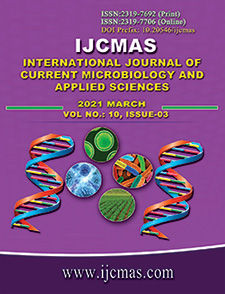


 National Academy of Agricultural Sciences (NAAS)
National Academy of Agricultural Sciences (NAAS)

|
PRINT ISSN : 2319-7692
Online ISSN : 2319-7706 Issues : 12 per year Publisher : Excellent Publishers Email : editorijcmas@gmail.com / submit@ijcmas.com Editor-in-chief: Dr.M.Prakash Index Copernicus ICV 2018: 95.39 NAAS RATING 2020: 5.38 |
Chickpea is best nutritional crop in leguminous species, and biotic and abiotic stress affects the yield loss around 50 to 60 % .For preventing yield loss from this stress, it is necessary to developed high yield, qualitative variety of chickpea. In vitro methods are best technique for regeneration and development of transgenic variety of chickpea. In this investigation research to determine chickpea in vitro micropropagation was studied in genotypes; of chickpea JG62, JG63 JG315, VIJAY and Bhupdachana with explants immature cotyledonary and embryonic axis. Explant were cultivated on Murashige and Sckoog (1962) medium with different concentration of plant growth regulators NAA (Naphtyl acetic acid) /BAP (Benzyl amino purine) and 2,4-D.Explant morphogenetic response was recorded after one month incubation. Results were expressed as embryogenesis and organogenesis regeneration frequency (shoot and root development from explants where JG62, JG63 genotype was more callogenic than VIJAY, JG315 and Bhupdachana. Under this investigation we found that callusing take place when basal medium is 2,4-D, whereas direct shoot differentiation occurs on basal medium supplemented with different concentration and combination of BAP with NAA, and both explants of chickpea immature cotyledonary node and embryonic axis have good response in vitro condition and can be used for development of transgenic variety in chickpea.
 |
 |
 |
 |
 |